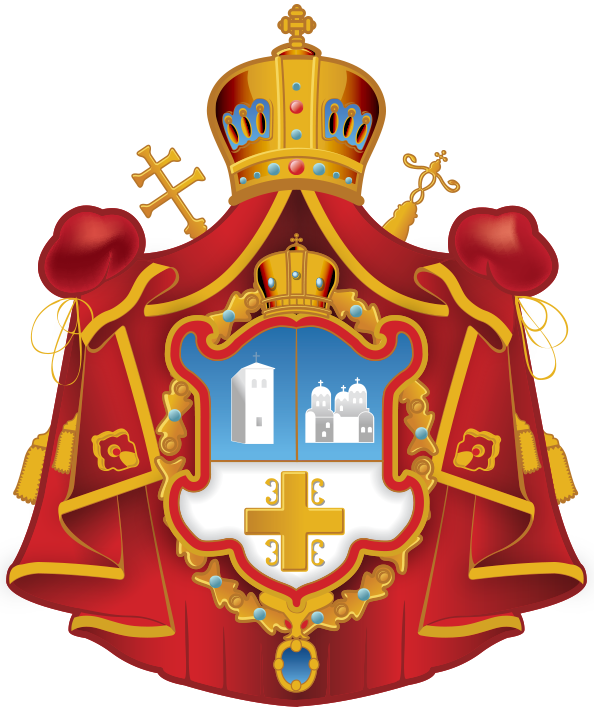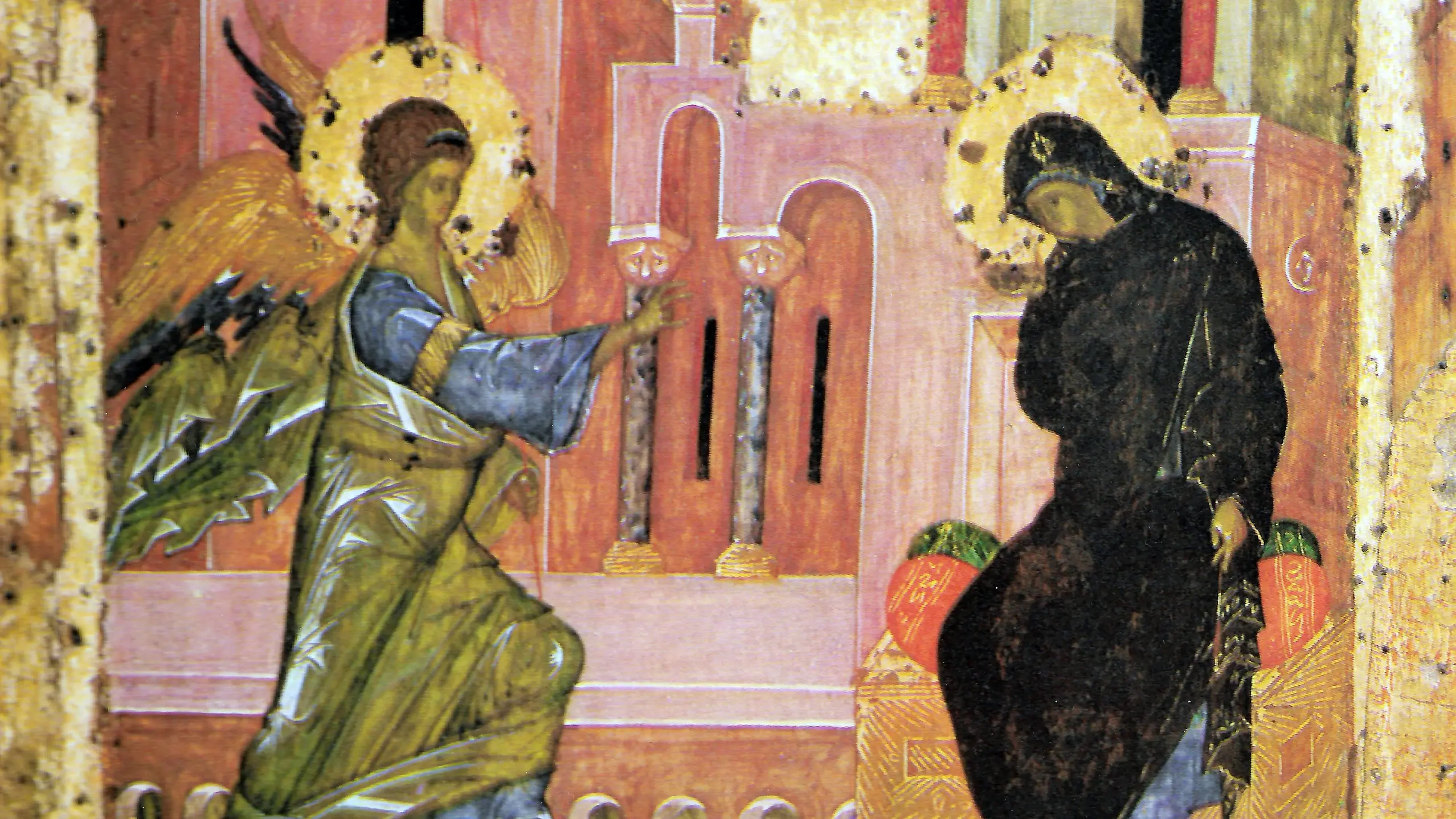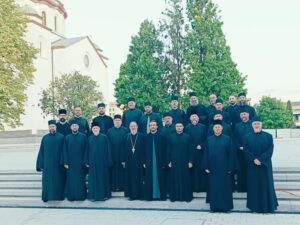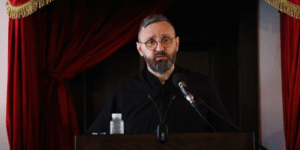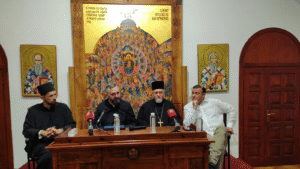We continue with the verses from the first chapter of the Gospel of Matthew.
Verses 22 and 23:
“Now all this was done, that it might be fulfilled which was spoken of the Lord by the prophet, saying: ‘Behold, a virgin shall conceive, and bear a son, and they shall call his name Emmanuel, which being interpreted is, God with us.”
In this verse, we see the characteristic style of the Apostle Matthew: he frequently refers to the fulfillment of Old Testament prophecies to show the Jews that Jesus is the promised Messiah. Here, the specific prophecy is from the Prophet Isaiah, who lived 800 years before Christ. Blessed Theophylact of Ohrid explains that when the angel says that the Lord spoke through the prophet, rather than simply stating that the prophet said it, he affirms the credibility of the prophet’s testimony.
According to Holy Tradition, it was precisely the righteous Simeon the God-receiver, one of the seventy translators of the Septuagint, who translated the book of the Prophet Isaiah. When he encountered this verse, about the virgin who would conceive, he was about to change it to a “young woman” (i.e., a young married woman), thinking that it was an error. At that precise moment, an angel appeared to him, stopping him and instructing him to translate it exactly as it was written, promising Saint Simeon that he would live to see this prophecy fulfilled. Although Simeon initially wanted to change “virgin” to “young woman” out of genuine concern and without any malicious intent, the Jews, on the other hand, deliberately distorted this verse, insisting that it should indeed be rendered as “young woman.” However, Blessed Theophylact responds logically by asking, why would it be a miracle if a young woman were to conceive? What would be unusual or supernatural about that which would be seen as a sign from the Lord God?
Another question posed by the Jews at that time (that some people still raise today as an argument against Christ) is this: why is He not called Emmanuel, if it clearly says in the Scripture “they shall call his name Emmanuel?” Why is He called Jesus and not Emmanuel?”
Saint John Chrysostom provides an excellent response to both the opponents of the Word of God at that time and those of today. He explains: “Why, you may ask, is He not named Emmanuel, but rather Jesus Christ? Because it was not said, ‘you shall name Him’, but ‘they shall name Him’, meaning the nations, and the event itself. Here, the name is derived from the event, as is customary in Scripture – events are used in place of names. Therefore, the phrase, ‘they shall call his name Emmanuel’ signifies nothing other than that they shall see God among men. Although God had always been with men, never was He so manifestly present. And if the Jews still stubbornly persist, we shall ask them, precisely what child was named ‘Swift to the spoil’ (Isa. 8:3)? They cannot answer this. Why, then, did the prophet say, ‘Call his name ‘Swift to the spoil?’ Because, after His birth, the spoil was taken and divided; therefore, the event itself, which occurred during His time, serves as His name.”
Saint Justin of Ćelije adds that Emmanuel, as a name of God, specifically means that God is with us, with our human nature. This implies that we are now able to be with God once again, as He has renewed our fallen nature.
We continue with the verses 24 and 25:
“Then Joseph, being raised from sleep, did as the angel of the Lord had bidden him, and took unto him his wife. And knew her not till she had brought forth her firstborn son: and he called his name Jesus.”
The Holy Fathers, especially Saint John Chrysostom, speak of Joseph’s decisiveness after the angel dispelled his doubts and calmed his soul. As a righteous man, he was ready to immediately fulfill the Lord’s will, without delay. This readiness to act promptly and without hesitation is a hallmark of the saints, as we see in the calling of the apostles – as soon as the Lord called them, they followed Him.
The phrase “and knew her not till she had brought forth her firstborn son, and named him Jesus” has often been a stumbling block for the rationally-minded interpreters of the Scripture, particularly among the Protestants, who argue that the Ever-Virgin Mary allegedly had marital relations with Joseph, after giving birth to Jesus, since the verb “to know” is frequently used in Scripture as a term for physical relations. Firstly, Holy Tradition tells us that Joseph was an elderly man, about 80 years old. Secondly, as the Holy Fathers point out, a witness to such a miracle, especially after subsequent angelic visitations, would not dare to touch the Virgin. Thirdly, Joseph’s great virtue is evident in his behavior when he was still troubled, as yet unaware of the mystery of the incarnation. Protestant interpretations often depict Joseph as a young man, as can be seen in their Christmas films and animations depicting the Nativity, where he is portrayed as a young, handsome man.
Saint John Chrysostom offers a brilliant refutation of this misconception: “How could such a righteous man as Joseph have desired to know the Virgin after such an indescribable miracle – that she has become a Mother in such a way, having been deemed worthy to give birth in an unprecedented manner and to bring forth an extraordinary Child? If he had known her and truly made her his wife, why then would Christ have given Her to His disciple as a woman without anyone to care for her, commanding him to take her into his home?” Saint John refers to the words of the Lord from the Cross, when He said to the apostle John, “Behold thy mother.” Chrysostom continues and says: “Some will say: why then are the children of James called the brothers of Jesus Christ? Just as Joseph was considered the husband of Mary.”
It is important to note that the construction of the sentence itself can confuse even some Orthodox Christians. The phrase “and knew her not till she had brought forth her firstborn son”, can lead to speculation about what happened afterwards, since the term “till” can make some people surmise that Joseph did not have marital relations with the Virgin Mary only until the miraculous birth. Blessed Theophylact provides the answer: “The word ‘until’ here does not imply that he did not know her before the birth, but did so afterwards. Rather, it signifies that he never knew her at all. This is the style of the Scripture, for it is written that the raven ‘returned not until the waters were dried up from off the earth’ (Gen. 8:7), yet it never returned afterwards either.” Blessed Theophylact refers here to events following the Flood. He continues: “Or, again, it is written, ‘Lo, I am with you always, even unto the end of the world’ (Matt. 28:20). Does this mean that Christ will not be with us after the end of the world? How could that be? Indeed, He will be with us even more so at that time. Thus, in this case, too, the phrase ‘until she brought forth’ should be understood as indicating that Joseph did not know her either before or after the birth. For how could Joseph have defiled her, knowing full well the ineffable nature of her childbirth?”
As for the term “Firstborn Son”, Blessed Theophylact addresses this Protestant-in-spirit misconception, even before Protestantism came about, which interprets the emphasis on “Firstborn” as proof that Mary and Joseph have had more children after the birth of Jesus. Blessed Theophylact writes: “He is called ‘Firstborn’, not because she supposedly later bore another son, but simply because He was born as the First and Only One: Christ is both the ‘Firstborn’, as the one born first, and the “Only Begotten”, meaning the one who has no other brother.”
